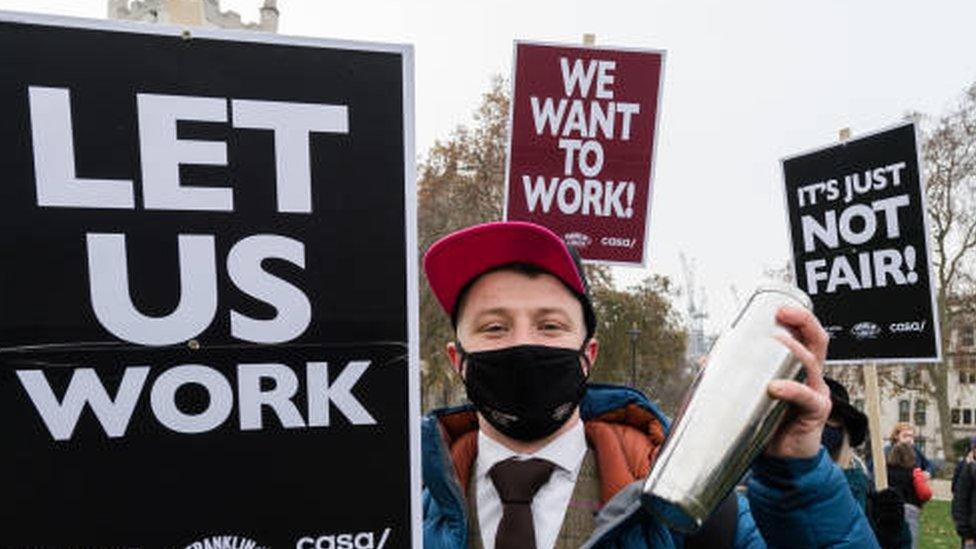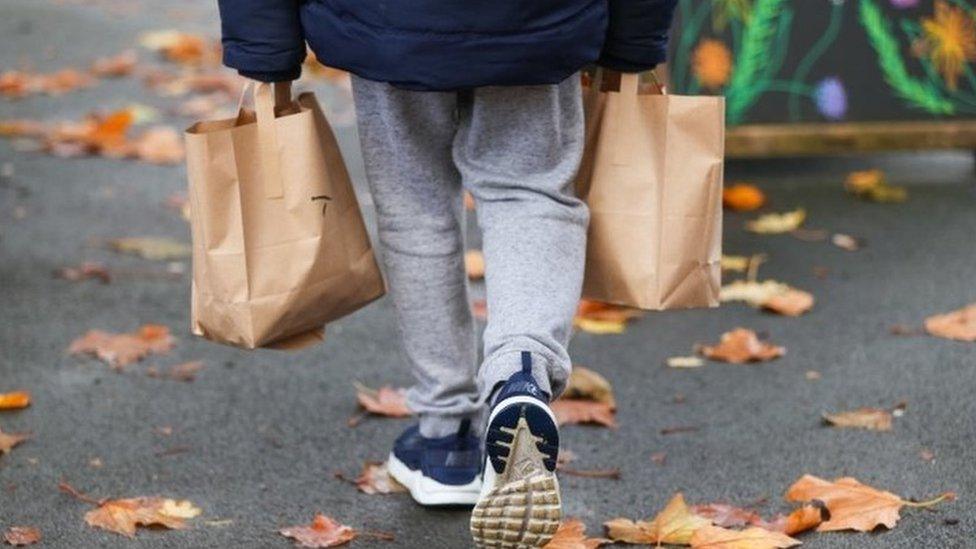Unemployment: 'I've made 200 applications and don't have a job'
- Published

Young people such as this (not Jamie Gilliam) have protested about the lack of opportunities
Frustrated young jobseeker Jamie Gilliam is just 22, but he estimates he's already applied for about 200 jobs without success.
Despite gaining a first-class politics degree from King's College London last year, he is finding the going tough.
Having started by applying for jobs that suited his degree, such as working for an MP or the civil service, he has now broadened his horizons to look for any kind of administrative role that will give him some experience.
"It's a very difficult time to be looking for a job. There are fewer opportunities because of the pandemic," he told the BBC.
Jamie, who lives with his parents in Romford in Essex, is not alone in his plight. Young people have been hit particularly hard by the labour market fallout from coronavirus, says a new report.
Workers aged under 24 account for nearly half of the total fall in employment during the economic slump, according to research by the Institute for Employment Studies (IES).
At the same time, more people are chasing fewer jobs, so young people are struggling to enter the employment market, the IES says.

Jobs in sectors such as hospitality have been hit hard
No feedback
Jamie says the most disheartening part is that employers are not prepared to help him improve by telling him how he did and explaining what went wrong.
"Quite simply, there are too many people like me to bother offering any feedback," he says.
"It's not just the rejection, it's the feeling that the door is fused shut and you just don't have a key."
He says that because there are so many applicants, his perception is that employers are actively looking for a reason not to hire him.
"It feels that if you make a mistake in the interview, there's no coming back from it."
Young people account for 46% of the overall fall in employment during the pandemic, but they represent just one in nine of the workforce. Those from ethnic minority backgrounds are the worst affected.
This has alarming implications for the economy, the report adds.
"Young people typically work in occupations that have been impacted most by the pandemic, making them most vulnerable to being laid off," says the report, published by the Youth Futures Foundation.
Only one in six people aged 16 to 17 is currently in employment, the lowest rate ever, says the report, although many young people have opted to stay in education to postpone entering the job market.
"However, those from the most disadvantaged backgrounds who would have relied on part-time work to support their studies, are likely to suffer the economic impact in the longer term and miss out on the valuable work experience to help them get a job in the future," it adds.
Other findings include:
Young people are bearing the brunt of lockdown, with 47% of those furloughed aged under 24
The fall in employment is four times higher for young black people and nearly as much for young Asian people
Almost 200,000 young people who are out of work have been unemployed for over six months.
One of the report's authors, IES director Tony Wilson, said young people were more likely to have jobs in hospitality, tourism, leisure and childcare, which had been hit hard by lockdowns.
"Not only is it harder for young people to get a job because there are fewer vacancies, but they're also more likely to have lost their jobs because they are in less secure work or subject to the 'last in, first out' principle," he added.
The Youth Futures Foundation's director of impact and evidence, Chris Goulden, said: "Inevitably, the most disadvantaged and discriminated against are most profoundly affected. There are alarming implications for our future economy and any ambitions to 'level up' our society."
Related topics
- Published26 January 2021

- Published21 January 2021
